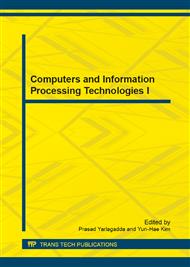p.49
p.57
p.63
p.69
p.74
p.79
p.90
p.100
p.105
An Identity-Based Conditional Proxy Re-Encryption in Cloud Computing Environments
Abstract:
In this paper, an identity-based conditional proxy re-encryption (PRE) scheme is proposed, where a delegator provides a re-encryption key satisfying one condition to a semi-trusted proxy who can convert a ciphertext encrypted under the delegator’s public key into one that can be decrypted using the delegatee’s private key. We address the identity-based proxy re-encryption scheme, where the delegator and the delegatee request keys from a trusted party known as a key generator center (KGC), who generates private keys for delegator and delegatee based on their identities. Meanwhile, the identity-based conditional proxy re-encryption scheme satisfies the properties of PRE including unidirectionality, non-interactivity and multi-hop. Additionally, the identity-based conditional proxy re-encryption scheme is efficient in terms of both the communication cost and the computing cost, and can realize security secret sharing in cloud computing environments.
Info:
Periodical:
Pages:
74-78
Citation:
Online since:
June 2014
Authors:
Price:
Сopyright:
© 2014 Trans Tech Publications Ltd. All Rights Reserved
Share:
Citation:


